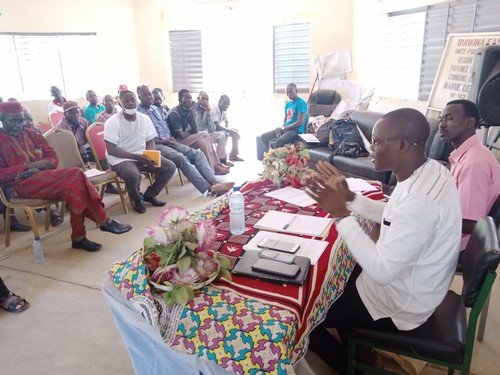Inades-Formation Burkina organized a workshop in Samba, on 09 and 10 July 2020, on sectoral policies and public actions implemented at the local level. Samba is a rural commune located in the province of Passoré, a locality in the Northern region of Burkina. About fifty people took part in this workshop , including members of the Monitoring Committee at the base of Samba, representatives of Village Development Committees (VDCs), municipal councillors and representatives of technical services. Objective: To enable local development actors to effectively monitor the implementation of public policies and actions in their commune.
Thursday 08 July 2020, in the courtyard of Samba town hall, people gathered in small groups are quietly exchanging. They are there to take part in an “exchange workshop on sectoral policies and public actions implemented at local level”. This activity, initiated by Inades-Formation Burkina, is organized in collaboration with the Samaba Town Hall. Around 9:30 am, everyone is invited to join the village hall of the town hall, the workshop will begin.
It is the mayor of Samba who opens the meeting. In his words, he thanks Inades-Formation Burkina for the initiative and invites the participants to take an active part in the workshop. The first deputy mayor of Samba will say later that “this activity will remain engraved in gold letter in the archives of the Samba town hall”.
On the programme of the two-day workshop, are six papers on sectoral policies and public actions implemented at the local level followed by exchanges and the elaboration of a mini action plan for the monitoring of public policies by the Samba grassroots monitoring committee. Representatives of different technical services are invited to exchange with the participants on the realities of sectoral policies and public actions at the commune level. The sectors that will be the subject of communication are: health, environment, education, agriculture, livestock. A communication is also reserved for the town hall.

Each of the exhibitors built their presentation on a specific policy.
For example, in the area of health, the issue of free health care for children from 0 to 5 years old and pregnant women was discussed. Concerning the environmental sector, the communication focused on the principle of environmental protection through the technique of Assisted Natural Regeneration (ANR). The presentation on education focused on endogenous school canteens. The presentation on agriculture dealt with the issue of subsidizing the purchase of agricultural inputs. The town hall communicated on the acts of civil state.
Dr. OUEDRAOGO Mahamadi, Quality of Care Manager at Samba Medical Centre, the communicator for the health sector, confides his feelings at the end of the workshop: “I very much appreciate the initiative of this workshop because it will allow the population to have some information on our work in health care. I am really satisfied with the exchange.
The participants in this workshop showed great interest in the different communications. This was reflected in the multitude of questions and comments following the various presentations.
Emile DJIGUEMDE, President of the Samba Village Development Committee, says at the end of the workshop: “We are very happy with this exchange which will really contribute to the development of our commune”. Anne Wendsida DJIGUEMDE of Samba CSB adds: “These two days of meeting that we had will surely bear fruit for the good of our commune because it opened our eyes on certain things”.
The Samba workshop on sectoral policies and public actions implemented at the local level ended with the elaboration of a mini action plan for the monitoring of public policies by the Samba Grassroots Monitoring Committee. The organization of this workshop is part of the implementation by Inades-Formation Burkina of the Support Project for Food Sovereignty, Local Governance and Sustainable Management of Natural Resources in the Northern Region. This project is financed by the Belgian NGO Broederliejk Delen.
Service Communication / Inades-Formation Burkina









